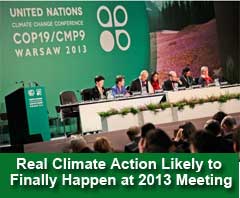The annual UN Climate Summit, held this year in Warsaw, Poland, is winding down to the last few days of its two-week run, and this year there is actually quite a bit of interesting news coming from the meeting, even as media coverage of the conclave is down dramatically from a few years ago.
It appears highly unlikely the meeting will produce any sort of global agreement for reduction of carbon emissions. That should not in a sense be surprising, as last year the group agreed to develop such a pact by 2015, giving countries a couple more years to reach such an agreement, with those plans theoretically being put into place by 2020.
But that doesn't mean there weren't some interesting developments.
First, Japan shocked the meeting by announcing that it is dramatically pulling back from its previous carbon emissions goal of reducing greenhouse gas emissions 25% from 2005 levels by 2020. Now, Japan said, the goal for reduction is just 3.8%.
The reason? The country's decision to shut down its wide network of nuclear power plants after the March 2011 earthquake and tsunami that wrecked the Fukushima reactors northeast of Tokyo.
The replacement of that power using plants burning coal and natural gas makes it impossible to reach the earlier targets, the country said in Warsaw.
Meanwhile, Australia also disappointed many attendees when its new prime minster, as promised in his election campaign, announced that he was introducing legislation that would repeal the carbon tax that was put in place in the country just some 15 months ago by the previous administration. Rising energy and other prices and concerns about a lack of competitiveness made the law very unpopular in the country.
Many believe that if the repeal goes through, Australia cannot achieve its voluntary target of reducing emissions by 5% by 2020.
Coal on the Hot Seat
More so than perhaps ever before, coal took a drubbing at the UN summit, with UN climate chief Christiana Figueres saying Monday at a related Warsaw conference that most of the world's coal reserves "will have to stay in the ground" and that further investment in mines and coal-fired power stations could go ahead only if it did not jeopardize the goal of limiting global warming to two degrees Celsius.
Addressing the chief executives of coal companies, she added that "my joining you today is neither a tacit approval of coal use, nor is it a call for the immediate disappearance of coal. But I am here to say that coal must change rapidly and dramatically for everyone's sake."
A group of 27 scientists from Germany, Japan, China, India, Brazil, South Africa and the US at the conference issued a statement saying that "unabated coal combustion" was incompatible with the two-degree target and nearly three-quarters of coal reserves would have to be left underground to achieve it.
 In the US, the EPA is in the process of putting in place regulations that may put coal-powered electric plants out of business over some period of time, and already the hurdles for new coal-based plants are so high that in in practice they are banned. In the US, the EPA is in the process of putting in place regulations that may put coal-powered electric plants out of business over some period of time, and already the hurdles for new coal-based plants are so high that in in practice they are banned.
But that is not the case across the globe. Europe's use of coal is actually expanding, as the decline in US consumption in recent years has driven global coal costs down, making it the low cost solution in many areas. After the Fukushima reactor problems in Japan, Germany decided to shut down its existing nuclear power plants that provide a substantial amount of its current power requirements, replacing them with some renewables (wind, solar) but also coal-powered plants. China is said to be adding about three new coal-powered plants every each month, though it is also investing heavily in cleaner energy as well, especially hydro power.
And then there is the money question. Developing nations want to know how the developed world plans to make good on a pledge to "mobilize" $100 billion annually by 2020 to help them cope with the effects of climate change and reduce greenhouse gas emissions.
Between 2010 and 2012, major developed countries contributed $30 billion to what was called the Fast-Start Finance fund, including $2.5 billion annually from the United States. But many say most of that money came from other foreign aid funds, robbing Peter to pay Paul.
"Now the hard reality," Todd Stern, the US State Department's special envoy for climate change, said in a speech last month. "No step change in overall levels of public funding from developed countries is likely to come anytime soon. The fiscal reality of the United States and other developed countries is not going to allow it."
There is some notion that a solid framework for the $100 billion fund, which has some developing country leaders salivating if not always for climate-related reasons, could be agreed to in Warsaw, but TheGreenSupplyChain.com thinks that is unlikely to happen this year - if ever.
We suspect the 2014 UN conference in Lima, Peru will end without much really getting done either, setting the stage for some real fireworks in Paris in 2015, at which the global agreement is supposed to be hammered out, as well as details on the funding for developed countries.
What's your take on the action at this year's UN climate summit? Will the $100 billion fund ever happen? Let us know your thoughts at the Feedback button below.

|